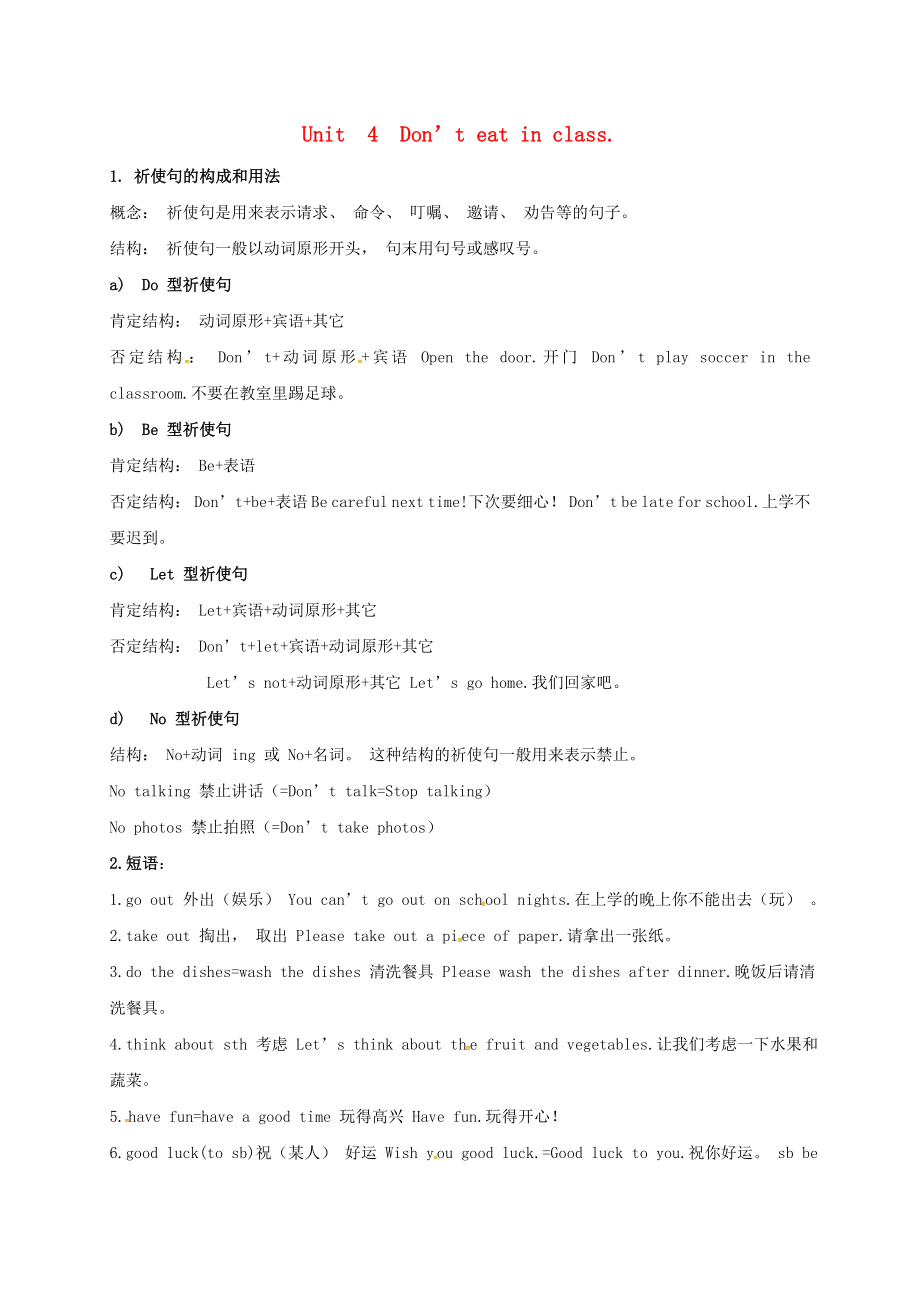《陜西省延安市富縣羊泉鎮(zhèn)七年級英語下冊Unit4Donrsquoteatinclass復(fù)習(xí)素材新版人教新目標(biāo)版》由會員分享,可在線閱讀��,更多相關(guān)《陜西省延安市富縣羊泉鎮(zhèn)七年級英語下冊Unit4Donrsquoteatinclass復(fù)習(xí)素材新版人教新目標(biāo)版(2頁珍藏版)》請?jiān)谘b配圖網(wǎng)上搜索�����。
1����、Unit?4?Don’t eat in class.
1. 祈使句的構(gòu)成和用法
概念: 祈使句是用來表示請求��、 命令��、 叮囑�����、 邀請�、 勸告等的句子。
結(jié)構(gòu): 祈使句一般以動詞原形開頭���, 句末用句號或感嘆號�����。
a) Do 型祈使句
肯定結(jié)構(gòu): 動詞原形+賓語+其它
否定結(jié)構(gòu): Don’t+動詞原形+賓語 Open the door.開門 Don’t play soccer in the classroom.不要在教室里踢足球���。
b) Be 型祈使句
肯定結(jié)構(gòu): Be+表語
否定結(jié)構(gòu): Don’t+be+表語 Be careful next time!下次要
2����、細(xì)心�����! Don’t be late for school.上學(xué)不要遲到����。
c) Let 型祈使句
肯定結(jié)構(gòu): Let+賓語+動詞原形+其它
否定結(jié)構(gòu): Don’t+let+賓語+動詞原形+其它
Let’s not+動詞原形+其它 Let’s go home.我們回家吧。
d) No 型祈使句
結(jié)構(gòu): No+動詞 ing 或 No+名詞����。 這種結(jié)構(gòu)的祈使句一般用來表示禁止。
No talking 禁止講話(=Don’t talk=Stop talking)
No photos 禁止拍照(=Don’t take photos)
2.短語:
1.go
3��、out 外出(娛樂) You can’t go out on school nights.在上學(xué)的晚上你不能出去(玩) ����。
2.take out 掏出, 取出 Please take out a piece of paper.請拿出一張紙�。
3.do the dishes=wash the dishes 清洗餐具 Please wash the dishes after dinner.晚飯后請清洗餐具��。
4.think about sth 考慮 Let’s think about the fruit and vegetables.讓我們考慮一下水果和蔬菜���。
5.have fun
4、=have a good time 玩得高興 Have fun.玩得開心����!
6.good luck(to sb)祝(某人) 好運(yùn) Wish you good luck.=Good luck to you.祝你好運(yùn)。 sb be lucky 某人運(yùn)氣好 She is lucky.她運(yùn)氣好�。
7.wait for sb 等待某人 I am waiting for you.我一直在等你。
8.arrive late for=be late for 為…而遲到
Don’t arrive late for work.上班不要遲到�����。
9.fight with sb 和某人大家 Don’t
5����、 fight with your classmates.
不要和你的同學(xué)打架�����。
10.make friends 交朋友 I want to make friends with you.我想和你交朋友����。
make sure 確信 Please make sure he is at home.請確認(rèn)他在家�����。
make one’s bed 鋪床 Every morning I must make my bed.每天早上我必須鋪床�。
make noise 制造噪音 Don’t make noise.不要制造噪音�����。
11.keep quiet=be quiet 保持安靜 Keep
6�����、 quiet, please.請保持安靜�����。 =Please keep quiet. keep healthy 保持健康 Running can keep us healthy.跑步能保持我們健康���。
keep cool 保持冷靜 Keep cool, don’t fight with him.保持冷靜����, 不要和他打架��。
keep up with 跟上 You must keep up with other students.你必須跟上其他學(xué)生���。
12.rule 規(guī)則(復(fù)數(shù)形式 rules) family rules 家規(guī) school rules 校規(guī) follow the rul
7�����、es=obey the rules 遵守規(guī)則 break the rules 違反規(guī)則 make rules 制定規(guī)則
13.“到達(dá)” 的用法表達(dá) get to+地方 arrive in+大地方 arrive at+小地方 reach+地方 get to school = reach school = arrive at school 到達(dá)學(xué)校
注意: home, there, here 是副詞��, 因此介詞 to��、 in����、 at 要省略, 如 get home 到家
14. listen to�����、 hear 和 sound 辨析: 兩者都表示“聽” 的意思 listen 有意識地聽�����, 但不一定聽到什么���, 強(qiáng)調(diào)“聽” 這個(gè)動作, 結(jié)構(gòu)“l(fā)isten+to+賓語” hear 強(qiáng)調(diào)聽的結(jié)果�, “聽見” ��。 sound 聽起來����, 系動詞+adj 做表語 He can’t hear you because he is listening to music now.他聽不見你����, 因?yàn)樗诼犚魳贰?That sounds interesting.那聽起來有趣。
 陜西省延安市富縣羊泉鎮(zhèn)七年級英語下冊Unit4Donrsquoteatinclass復(fù)習(xí)素材新版人教新目標(biāo)版
陜西省延安市富縣羊泉鎮(zhèn)七年級英語下冊Unit4Donrsquoteatinclass復(fù)習(xí)素材新版人教新目標(biāo)版

